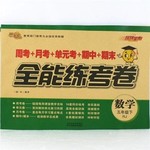题目内容
Catherine Destivelle is a rock star. She loves rock, but she can't sing or play the guitar! She is a rock climber and a big star in France and Italy. She is the most famous woman climber in the world because she often climbs without ropes. She climbs in many countries but most often in the French Alps near Chamonix, where she lives. She started climbing near her home in Paris when she was five. Then, at fourteen, she joined the French Alpine Club to learn more, but immediately she climbed better and more quickly than the other members of the club. She won her first competition in Italy in 1995.
Three years ago she found a new route up the Dru Mountain near Chamonix. The climb took eleven days and for four days the snow was so heavy that she could not move. Last year other climbers tried to follow the new Destivelle Route, but they failed. They are going to try again this year.
People always ask her about her climbing. She says, "I climb because I'm in love with mountains. I like touching the rock and reading the face of the rock. I like it a lot. I felt at home on the side of a mountain. I prepare well before I go, so I'm never worried."
Catherine chooses new mountains from books—like buying from a shopping catalogue (目录)! "I see a nice mountain and I go to climb it!" Her next mountain is in Pakistan. She is going there next month."It's much bigger than the Dru, so it's going to take longer to climb. An American climber, Jeff Lowe, is coming with me to help." (283 words)
56. Catherine Destivelle is called ‘a star’ because ________.
A. she won a competition in 1995 B. she loves rocks
C. she's a famous woman climber D. she found a new route up to the Dru Mountain
57. Catherine had great trouble finding the way up the Dru Mountain because _______.
A. she lost her way B. the climb took 11 days
C. she needed help from an American climber D. there was heavy snow
58. On the side of a mountain she feels _______.
A. worried B. easy and happy C. like staying in the air D. healthy
59. We can infer from the passage people often ask her “______”.
A. Why do you like climbing? B. Are you in love with an American climber?
C. Do you enjoy reading books on mountains? D. What do you do before you go climbing?
CBDA

 全能练考卷系列答案
全能练考卷系列答案 一课一练课时达标系列答案
一课一练课时达标系列答案Peter, Catherine, Helen, Elizabeth和Levin 正在澳门科技大学学习,在休息日他们想去参观澳门的众多的博物馆(A-F),请根据他们各自的兴趣帮助他们选择一个适合个人兴趣的场馆,并在答题纸上相应的选项标号涂黑。选项中有一项是多余的。
1. Peter: I’d like to go to some larger museums, where I can get an over-all view of Macau’s history and culture.
2.Catherine: My family runs a small wine mill in China, so I’d like to learn about wine production.
3.Helen: I’m crazy about car races. I’d like to visit some museum related to car races.
4. Elizabeth: The idea of Macau’s returning to China has always excited me. I’d like to see the location where the exciting moment took place.
5.Levin: I’d like to take the chance to see a collection of traditional and modern art works.
A. Macau Museum
The Macau Museum is a historical and cultural museum with a vast number of objects of great historical value, which demonstrates the way of life and cultures of the various communities which have been inhabited the city for ages. The Macau Museum was opened on 18th April 1998, consisting of two underground levels and a third one above the fortress' top platform where the old Meteorological Services is housed. The architectural character and special configuration of the architecture has been retained and preserved.
If the history of Macau is really connected to the sea, there is no better place for the Maritime Museum, than the Square of the Barra Pagoda, dedicated to the Taoist goddess "A-MA", the protector of fishermen, and also believed to be the place where the Portuguese first landed. The precise spot is where the Maritime Museum is located, the building is in the shape of a sailing ship anchored in the waters of the Inner Harbour.
C. Wine Museum
This 1400 square-metre space is divided into a number of areas (Historical information/Wine Cellar/Museum and Exhibitions), using maps, texts, photos, tiles and videos, among other things to relate the history of wine. The aim of each section is not only to provide information regarding wine and grapevines, but also to recreate the atmosphere of the production of wine, showing the visitor the modern and traditional tools connected to wine production.
D. Grand Prix Museum
Opened 1993 to celebrate the 40th anniversary of the Macau Grand Prix, which features a number of automobile and motorbike races and takes place every year in November. It started in 1954 due to the enthusiasm of a group of Macau residents and the support of the authorities. Today it is an international sports event that attracts thousands of tourists and racing enthusiasts to Macau, to watch the classic "Guia Race" and the "Formula 3 Grand Prix". As it takes place on a street circuit, which inevitably leads to a comparison with Monte Carlo, the Macau Grand Prix has been developing into a race that, due to the exactness and the need for precision which it imposes on the drivers, has had the participation of great names of the motor racing participating and which has also served as a launching platform for many other names, the visitor will certainly recognize while visiting the Grand Prix Museum.
Under the management of the Civic and Municipal Affairs Bureau, the Macau Museum of Art is the only art museum in Macau, and provides the largest space dedicated to visual arts. It is situated in the Cultural Centre of Macau in the Outer Harbour area, and was inaugurated on 19 March 1999, with a total area of more than 10,000 square meters and expositive capacity of almost 4,000 square meters. The artistic works and cultural artifacts include Chinese Calligraphy and Paintings, Seals, Ceramics, Copperwares, Western paintings, Contemporary Arts, Photography artworks, and other significant collections.
F. Handover Gifts Museum of Macau
The Handover Gifts Museum of Macau is located next to the Macau Cultural Centre in Avenida Xian Xing Hai (NAPE). The location of the Museum is also the area that was used for the Handover Ceremony on 20th December 1999 in which Macau was returned to the Mainland. When the hall was dismantled after the ceremony the area became part of the Macau Cultural Centre. The Handover Gifts Museum of Macau was opened December 2004. The main aim of the Museum is to commemorate the handover for its significance in Macau's modern history. The inauguration of the Museum on the 5th anniversary of the handover is also indeed significant and momentous.